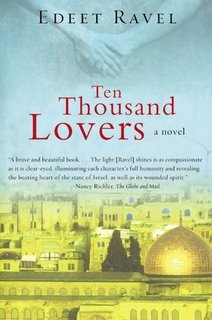Ten Thousand Lovers by Edeet Ravel
 I just finished the book last night. Reading it, I kept thinking—as I'm sure the author intended—about the debate and horror in the US at torture and abuse at Abu Gharib, at rendition, a "torture memos" and all that stuff.
I just finished the book last night. Reading it, I kept thinking—as I'm sure the author intended—about the debate and horror in the US at torture and abuse at Abu Gharib, at rendition, a "torture memos" and all that stuff.It's a well put together book and the suspense works. There are two time periods—a present where the main character, Lily, a Canadian who was actually born on an Israeli kibbutz, is living in London. Her daughter is grown and visits with her boyfriend. The reader soon learns that Lily is writing, not her usual academic book, but one about her own experience in Israel as a student in the 70ies. In that other "present"—where the book begins and ends—Lily meets her lover while hitchhiking. He’s handsome and caring and she falls for him (as he does for her) completely. The problem is he’s an interrogator who works for the army and sometimes for the security services, interrogating Palestinian prisoners. Lily is turned off by the violence implied in his job. She soon learns that he is as turned off as she and accomplishes his “miracles”—for his bosses find him more effective than anyone else—without violence. But he hates the army and the growing violence—even torture—that is not only condoned but encouraged. He senses that the oppressed have become the opressors.
The suspense comes because of the mature Lily writing in her London flat—obviously living alone, telling her story. The lover, Ami, is no longer in the picture and the reader reads on to learn what happened to him and to their relationship. There’s a third element in the narration and that is the discussion of the Hebrew language and how it has become adapted from the language of the Bible to modern life. These sections are very well done, interesting, not too long and always connected thematically to the action of the novel.
I wonder if this book is popular in Israel? I had to refresh my memory about Israeli history since the '67 war which I watched on TV (Vietnam was NOT the first televised war). I wasn’t sure about the “territories”, but learned that the West Bank and Gaza were the areas won in that war and not, like Sinai, given back. I’ve never been to Israel, but my sister had several times and she gave me a quick history refresher. Besides she had also lived in Egypt and a bit in Syria and Jordan too, so had the Middle East perspective.
It really never dawned on me before to think about Israel's desire to have a "Jewish majority" or to consider how unrealistic that is. Or to consider the difference in the positions of the Palestinians who stayed as Israeli citizens and those who left and lived in camps. My sister said her impression was that though ethnically Jewish most Israelis were more like Europeans than Americans in terms of their religious practices—pretty secular. Sort of like the reaction of Lily and Ami to the fact that the only way to get married was in a religious ceremony. My sister also said that many of the Russian immigrants to Israel in the last 30 years or so have also been ethnically Jewish but not "religious" or even familiar with religious observances. Issues the novel touches upon are the difference between a Jewish state and a democratic one and the difficulty of marrying the two concepts.
I enjoyed the novel and didn't figure out the title till the end (unfortunately had I not been told otherwise I’d have assumed it was a romance novel). But I can’t explain the title without giving away the plot….


0 Comments:
Post a Comment
<< Home